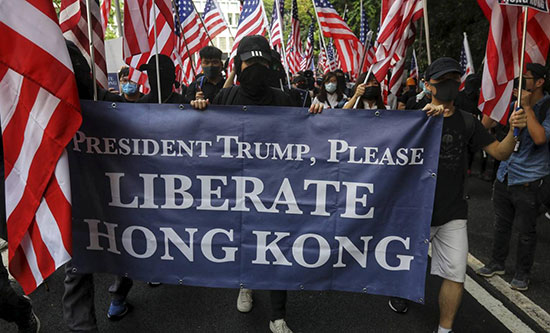
The protests in Hong Kong which began early this year have yet to demobilise. They began in opposition to a proposed new extradition law which would allow suspects charged with serious crimes to be extradited for trial to the Chinese mainland. The proposed law was formally withdrawn in September. The focus has now changed to demands including the dropping of charges against those arrested during the protests, and outright opposition to Hong Kong being part of the People’s Republic of China (PRC). The reactionary pro-imperialist character of a section of the demonstrators has been expressed by the display of British and US flags and calls for either Britain or Trump and the US to ‘save’ Hong Kong, alongside chauvinist slurs against mainland Chinese.
For over 150 years, Hong Kong was a prized possession of British imperialism, seized from China in the Opium Wars of 1841 and used as a gateway to exploit China, before developing into a financial centre for British imperialism in the Far East. Finally, as an unjust 99-year treaty imposed on China in 1898 ended, Britain was forced to leave Hong Kong and hand back sovereignty to the PRC in July 1997. The agreement reached between Britain and the PRC, reflecting China’s need to have access to foreign technology and capital, stipulated that for 50 years, until 2047, Hong Kong would retain its capitalist system under a ‘one country two systems’ principle, developed by the Chinese leadership in 1982.
The proposal for a new extradition law was motivated by the fact that Hong Kong does not have any extradition agreements in place with Taiwan, Macau or the Chinese mainland. This has allowed criminals based in Hong Kong to escape justice for serious crimes committed in those jurisdictions. The proposed law included extradition for crimes recognised across the world such as murder, robbery, kidnapping and rape; crucially it also included business and financial crimes.
As soon as the new law was proposed in February 2019 capitalist interests, including the American Chamber of Commerce (AmCham), which represents over 1,200 US companies active in Hong Kong, voiced their opposition:
‘Any change in extradition arrangements that substantially expands the possibility of arrest and rendition…of international business executives residing in or transiting through Hong Kong as a result of allegations of economic crime made by the mainland government…would undermine perceptions of Hong Kong as a safe and secure haven for international business operations.’
Opposition groups in Hong Kong came together to form a coalition against the proposal, called the Civil Human Rights Front. A number of these groups, including the Hong Kong Confederation of Trade Unions (HKCTU), have open links with the US National Endowment for Democracy (NED) which is funded by the US government and has as its remit to support and fund groups and organisations that promote a pro-imperialist agenda under the guise of advocating democracy. The NED and its offshoots have been active in Hong Kong since the mid-1990’s, funding various groups opposed to unification with the PRC. It is this Civil Human Rights Group that has been organising the protests, including the widely-reported demonstrations at Hong Kong International Airport, which have taken on a more violent and anti-PRC character.
Although the political impetus for the anti-extradition protests came from sections of the Hong Kong ruling class and business elite, the size of the protests and their ongoing nature reflect deep social problems in Hong Kong society caused by the massive gap between rich and poor. 93 billionaires live in Hong Kong, a number second only to New York, while a recent Oxfam report on Hong Kong shows 1.3 million people, out of a population of nearly 7.5 million, living in poverty. The monthly income of the top 10% of the population is 44 times that of the poorest 10% and wealth inequality is now at its highest level for 45 years. The number of poor households has reached 530,000, with one in three people aged over 65 and one in four children living in poverty. Yet at the same time the mega-rich receive untaxed share dividends worth billions of Hong Kong dollars (7.84 Hong Kong dollars = 1 US dollar).
Land values in Hong Kong are approximately triple those of London’s richest borough of Kensington & Chelsea. Consequently, there is a massive shortage of decent housing for the working class with over 210,000 people living in squalid conditions in small sub-divided rooms, and over 40,000 living in what are called ‘cage homes’ or ‘coffin cubicles’. Hong Kong is officially the least affordable place in the world to live, with the average price for ‘normal’ property being $1.2m, clearly out of reach for the majority of people when the minimum wage is set at HK$34.5. Rents for sub-divided rooms have gone up 100% over the past ten years.
This massive gap in wealth between the mega-rich and the poor has been a source of some support for the anti-extradition protests, with the PRC rather than the capitalist nature of Hong Kong being blamed for this situation. A growing number of people in Hong Kong identify as ‘Hong Kongers’ rather than Chinese, and have a negative view of the PRC. The fact that the PRC gained sovereignty over Hong Kong in 1997 but were prevented from confronting and politically disarming the pro-imperialist elite has left working class forces in Hong Kong in a seemingly weak political situation.
Bob Shepherd
FIGHT RACISM! FIGHT IMPERIALISM! 272 October/November 2019




